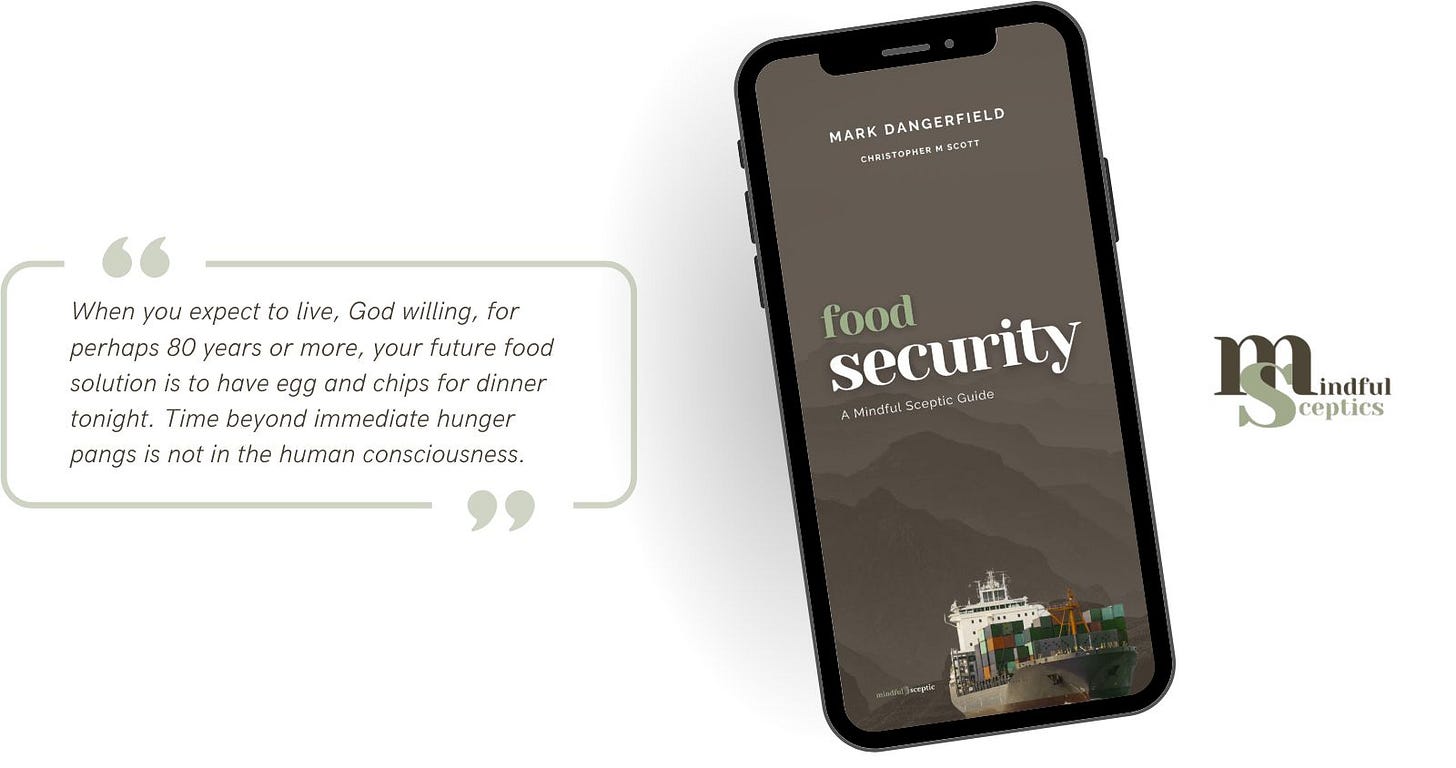Food Security | A Mindful Sceptic Guide
Development agencies promise to "feed the world." Agricultural technologists focus on yield increases. Environmental groups debate sustainable farming methods. Politicians call for more food production to meet growing demand.
But what if the entire "food shortage" narrative misses the fundamental reality?
What if we already grow enough food for everyone, and the real crisis isn't production, but the four interconnected systems that determine whether people actually eat?
What if food security represents humanity's most urgent existential threat, surpassing even climate change?
About The Book
Food Security offers a clear-eyed examination of why one of humanity’s most basic needs remains so vulnerable. John Mark Dangerfield and Christopher M Scott dismantle the idea that producing more food is the answer, revealing instead a complex web of distribution failures, ecological constraints, political dysfunctions, and systemic oversights.
The book reframes food not as a commodity, but as a signal of how well we manage land, energy, inequality, and risk. With careful attention to both data and history, Dangerfield & Scott invite readers to think beyond calorie counts and crop yields, and consider the institutional, climatic, and cultural conditions that determine who eats and who doesn’t.
Why Read This Book?
You’ll understand why food insecurity persists even in high-production countries
You’ll see how climate, conflict, and logistics interact to undermine supply chains
You’ll gain a framework for evaluating food policies beyond ideology or charity
You’ll sharpen your scepticism about techno-fixes and crisis narratives
Why This Matters Now
As we face unprecedented challenges in feeding a growing global population, our industrial agriculture model shows increasing signs of strain. Climate change, soil degradation, and geopolitical tensions are creating new vulnerabilities in our food systems while the fossil fuel energy pulse that powers modern agriculture begins to wane.
Our decisions about food production and distribution in the coming decades will determine not just who eats but the stability of human society. This guide provides the critical thinking tools needed to understand these challenges and evaluate potential solutions, moving beyond simplistic narratives about producing more food.
Who It’s For
This guide is for:
Policy thinkers, NGO workers, systems analysts, and concerned citizens
Readers who want a deeper, data-driven understanding of hunger and resilience
Contrarians tired of both market utopias and humanitarian clichés
It’s not for:
Those seeking quick fixes or single-cause explanations
A Taste from Inside
"The modern food system is not broken — it’s working exactly as it was designed to."
"We’ve confused food security with food abundance — and paid the price."
"No one starves in a functioning state."
"Charity can fill gaps, but it cannot build systems."
"A resilient food system isn’t one that grows the most — it’s one that fails the least."
About the Authors
Dr John Mark Dangerfield writes for sceptical minds and curious professionals. With an academic and professional background in ecology, policy, and commerce, he brings systems thinking to real-world problems. Christopher M. Scott is a restoration ecologist and bush regeneration practitioner with a lifelong sceptical eye on environmental orthodoxy. When not restoring landscapes or growing plants in his nursery, he’s digging into the science of nutrition, health, and ecological resilience.
This book is part of their Mindful Sceptic Guides series, which think deeper so you don’t have to shout louder.
"The fact that billions of humans alive today have food is a miracle of human ingenuity and the generosity of nature. But the four pillars of food security—availability, access, utilisation, and stability—show that growing food is just the first challenge. Getting the right food to people all the time is a logistical, societal and political challenge of unprecedented size and scope." Mark Dangerfield
Ready to Read?
Not Ready to Buy?
Join the free Mindful Sceptic Newsletter for weekly essays that think as hard as you do.


